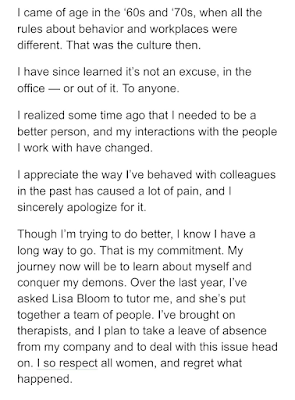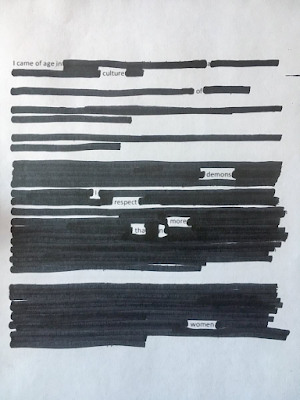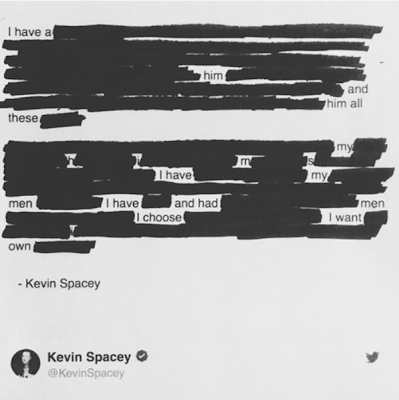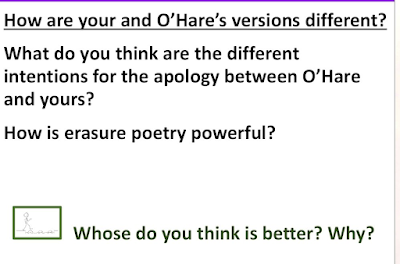This is a lesson I made on redacted poetry to get students to really think about the choices writers make about the words they use. This is based on the erasure poetry of Isobel O'Hare on the #MeToo movement.
movement.
I find students struggle to explain the effects of writer's methods because they can't articulate or even consider something as simple as word choice, much less more complex techniques. This lesson was to address this and really get them thinking about what a writer is saying both overtly and in the subtext of their writing, why they are conveying it the way they are and how their words hold power.
The lesson starts with a clearly forced and insincere apology and get students to think about its subtext and why it may not be sincere:

Then I teach some context about the #MeToo movement.
movement.
Now, because they really need to think about the word choice and the power of words, I show how the poet transformed Weinstein’s 'apology' into a redacted poem. We talk about the problem with the apology to begin with and how O'Hare has used his own words against him. Why those words, as opposed to others in the text? Why is it powerful as a piece of poetry? How is it even classified as poetry?


Now they’ve seen an example, they attempt to redact Kevin Spacey's apology without looking at O’Hare’s version and try to use our discussion to think carefully about which words hold the most power and how their intent can be subverted/illuminated. This is very much a guided task, started off under the visualiser and then they continue it, discussing it in pairs as they work.

Showing them O'Hare's version at this point allows them to compare their word choice with hers and consider why she made the choices she did. Also it gets them exploring the reasoning behind their own choices and start articulating these - how can they do this with someone else's hypothetical choices, if they can't do it for their own? It is a good opportunity to consider the varying impact between the two - how can the same text deliver such different effects?


Now there's been an (I) do and a we do, they do the same with Trump's apology:

My students really engaged with this lesson and while there were varying examples, with varied sophistication, what I did get from every single student was a real consideration of word choices - that has to be the first step into more in-depth analysis and a better quality of writing.
All resources are available on the 'Resources' page of this blog.
I find students struggle to explain the effects of writer's methods because they can't articulate or even consider something as simple as word choice, much less more complex techniques. This lesson was to address this and really get them thinking about what a writer is saying both overtly and in the subtext of their writing, why they are conveying it the way they are and how their words hold power.
The lesson starts with a clearly forced and insincere apology and get students to think about its subtext and why it may not be sincere:
Then I teach some context about the #MeToo
Now, because they really need to think about the word choice and the power of words, I show how the poet transformed Weinstein’s 'apology' into a redacted poem. We talk about the problem with the apology to begin with and how O'Hare has used his own words against him. Why those words, as opposed to others in the text? Why is it powerful as a piece of poetry? How is it even classified as poetry?
Now they’ve seen an example, they attempt to redact Kevin Spacey's apology without looking at O’Hare’s version and try to use our discussion to think carefully about which words hold the most power and how their intent can be subverted/illuminated. This is very much a guided task, started off under the visualiser and then they continue it, discussing it in pairs as they work.
Showing them O'Hare's version at this point allows them to compare their word choice with hers and consider why she made the choices she did. Also it gets them exploring the reasoning behind their own choices and start articulating these - how can they do this with someone else's hypothetical choices, if they can't do it for their own? It is a good opportunity to consider the varying impact between the two - how can the same text deliver such different effects?
Now there's been an (I) do and a we do, they do the same with Trump's apology:
My students really engaged with this lesson and while there were varying examples, with varied sophistication, what I did get from every single student was a real consideration of word choices - that has to be the first step into more in-depth analysis and a better quality of writing.
All resources are available on the 'Resources' page of this blog.
Comments
Post a Comment